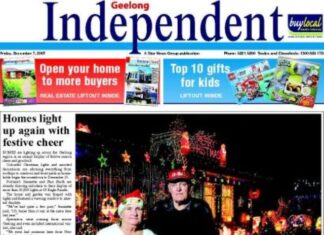Andrew Mathieson
OF ALL things influential in her life, it was a jar packed of baby brown snakes that Helen Burrell most fondly credits for bringing the Australian bush into the family home.
However, the rebellious teen was quick to discover that her wisdom didn’t match her enthusiasm – she soon had a lot of explaining to do after harmlessly thinking the wriggly creatures were only legless lizards.
“They were quite venomous, actually,” Helen admits.
“My whole family was horrified and I spent a whole afternoon catching them.
“I wasn’t too popular with them that day but I didn’t get bitten.”
Just about every type of native wildlife is now sprawled throughout her well-lived Leopold suburban residence.
Even husband David doesn’t seem to mind the menagerie.
They met on Helen’s 11th birthday in Mildura after she caught him letting down the tyres on her bike.
“She actually gave me a belting,” David laughs.
Helen and David married at 16 and after their three children left the nest they transformed their home into Leopold Wildlife Centre.
The backyard contains a free-flight aviary and the spacious front a kangaroo enclosure.
Inside, the bedrooms are used for neo-natal care and one has been converted into a makeshift hospital.
“That was our son’s room and it was redesigned the minute he moved out,” David grins.
“He asked to come back but I had to say ‘Sorry mate, it’s an animal hospital now’.
“He copped it on the chin and all our kids have accepted what we do.”
David gave up a good-paying mechanic’s job in 1997 to not only take charge at the animal retreat but also work in a long-term carer’s role after his wife was diagnosed with coronary artery disease.
But nothing could keep Helen out of her sick bed.
Stubbornly she attended some rescues on the way home from her own hospitalisation.
“Three days after the surgery I was raising that little wallaby,” she says, pointing to a photo stuck on a snake tank in the loungeroom.
Helen had to sneak her “baby” into the hospital because it wouldn’t eat or toilet unless she was there.
“I tend to bring babies into my bed on a cold night, too, – not human babies,” Helen says.
“The grandkids have tried that and it’s not just on.”
The Burrells make about 1500 rescues a year and Helen alone puts in 80 hours each week.
David not only shares her passion but embraces it.
However, Helen initially had to coax him into lending a hand during her third-ever kangaroo rescue.
“This kangaroo was nearly seven-foot tall, 80 or 90 kilos – it was absolutely huge,” David recalls.
“Helen’s looked at me and said ‘There’s no way I can catch this thing’, so I caught it for her.”
However, David reckons his confidence comes down to strutting around in his protective beige moleskins.
Helen agrees and is quick to talk up David’s growing reputation.
“I nicknamed David The Roo Whisperer and it’s sort of stuck,” she says.
The tag is painted on his side of their ute.
But it doesn’t always go to plan, they admit.
David has copped the brunt of a few hard hits, although they are becoming fewer nowadays.
He came to the rescue of an injured joey near Mt Duneed that had been hit and was unable to stand.
After bagging the crying roo, its mum lashed out.
Helen mimics the incident.
She yells “Bang, bang, bang” to imitate the sound of the kangaroo’s legs whacking David’s slender body.
“It kicked the bejesus out of him and screaming,” Helen remembers.
But after licking his wounds, there was no condemnation from David.
“She was just being a good mother,” he insists.
“I was proud of her and would expect nothing less.”
Get the latest news to your email inbox FREE!
REGISTER





